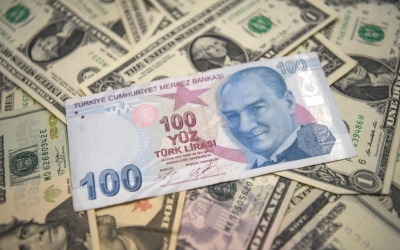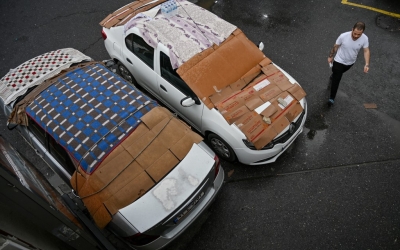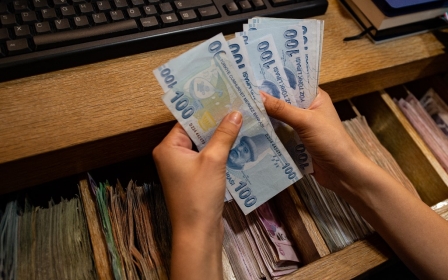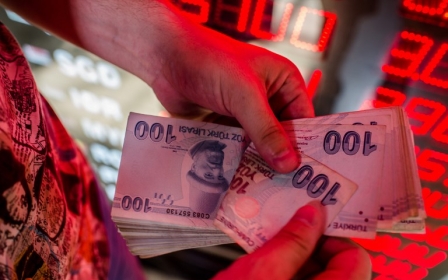Turkey lira crisis leaves workers and middle class struggling to make ends meet
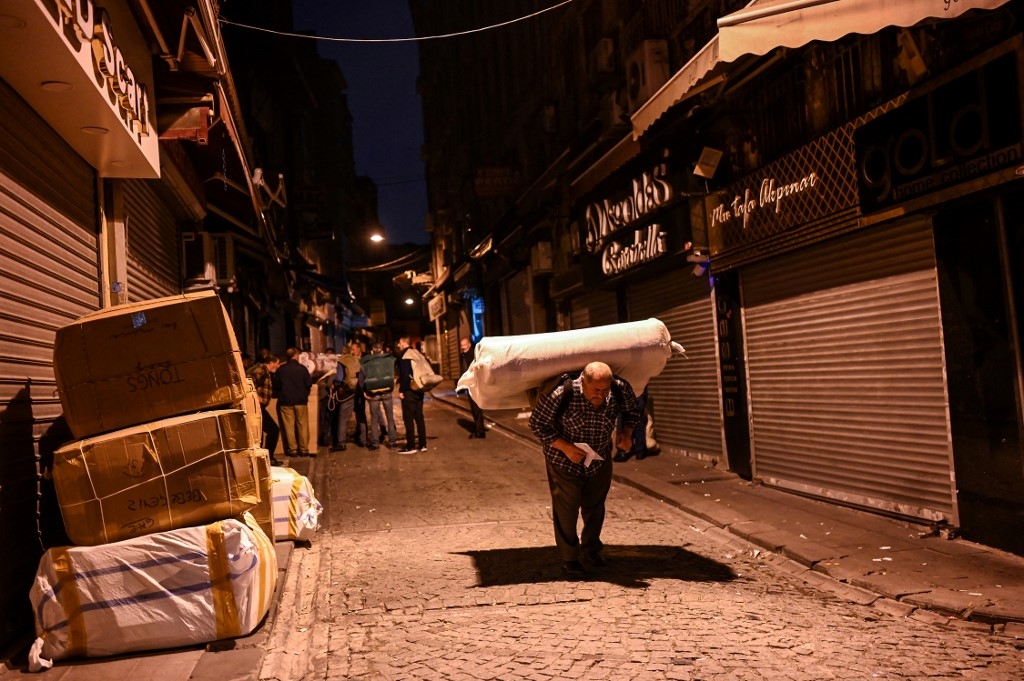
“We only eat if we can find [something]. We don’t if we can’t,” said Nurcan Yilmaz, a widow and mother of three, as she recounted her struggle to survive amid soaring inflation and hikes in food prices in Turkey.
“I follow sales in the markets to buy cheese, olives or detergents. I go to the bazaar to buy vegetables and fruits but after 5pm, because I can then buy soon-to-be-rotten vegetables or fruits for half price," she said.
"I miss previous years, when life was easier.”
'I cannot survive unless social aid foundations and my relatives help me'
- Nurcan Yilmaz, a widow and mother of three
Nurcan’s complaints were rooted in the Turkish lira’s record-breaking and steady fall against the US dollar, falling around 10 percent in a single day on Tuesday.
The latest drop came after Turkey’s Central Bank cut interest rates last week and President Recep Tayyip Erdogan declared that Turkey was in an “economic war of independence”.
Despite criticism from several economists and opposition parties, Erdogan and Sahap Kavcioglu, head of the Central Bank, have pursued the unorthodox policy based on the idea that higher interest rates causes higher inflation.
The inflation rate was officially 19 percent last month, but most believe the real number is much higher.
Lower interest rates have devalued the lira, bringing higher prices through imports of essential goods, which affect the daily lives of low- and middle-income Turks.
“My regular income is around 1,500 lira ($120). But the rent increased to 2,200 lira ($176) a few months ago," Nurcan said. "I can never buy the same products at the same price in the market, in the same week.”
Some low-cost chain markets have begun imposing sale quotas for certain products, such as sugar, wheat, oil and coffee, due to the rise in prices and problems with the supply chain.
“I cannot survive unless social aid foundations and my relatives help me,” said Nurcan.
Wage increases 'useless'
Ugur Gurses, an economist and former Central Bank employee, said the cost of living increases are expected to become more painful in the coming months.
“Higher waves of fluctuations will erode the Turkish lira, and this will be strongly felt in our daily lives,” he told Middle East Eye. “Probably, the government will increase the minimum wage, but the increases will become useless when the rise in the US dollar begins exhibiting its impacts on inflation.”
Currently, the minimum net weekly wage in Turkey is 2,825.90 lira ($220), lagging behind all of the EU countries. The wage was equal to $382 when it was announced last year.
In 2016, the equivalent level was close to $550, surpassing some EU countries, like Bulgaria and Hungary. In Turkey, around six million people earn the minimum wage.
'I can’t pay the rent. I can’t buy even basic food. I don’t know whether I should start begging people'
- Ahmet Gormez
Ahmet Gormez, who lives in Istanbul with his wife and two children, said they were feeling the economic pressure more than ever.
“I can’t pay the rent. I can’t buy even basic food. I don’t know whether I should start begging people. People pay less attention since everybody is facing financial problems,” he said.
Gormez works in cleaning services at a private hospital, earning the minimum wage.
“But I receive extra for having children," he said, "Still, the salary doesn’t exceed 3,500 lira [$280]. The rent increased to 2,000 lira [$160] in the summer, up from 1,500 [$120].”
Rents have skyrocketed in Turkey in the past six months, due to a shortage of available properties as demand grows, following an unprecedented hike in construction costs.
“Now we need social aid, [we are] waiting for Ramadan, when people become more generous. It was not like this in previous years,” Gormez added.
“Poverty is on the scene in Turkey,” said Gurses, the economist, adding that the purchasing power of an average Turk is declining sharply.
Middle class at risk
Indeed, low-income families have not been the only ones to suffer from the currency's depreciation; the middle class have, too.
The hike in prices of cars, rent, electronic goods and holidays has begun to deprive the middle class of former comforts or luxuries.
“First, we cut cultural expenses like going to the cinema or the theatre. Due to the pandemic, we've stopped going out for dinner. Now, we’re just thinking about how to make ends meet,” Murat said, using only his first name, due to his job at a state institution.
Murat and his wife both work as government employees earning average salaries, which together amount to 15,000 lira ($1,200). Their loan payment for a mortgage on a flat in Istanbul’s Kartal district, located a considerable distance from downtown, is 6,000 lira ($480) a month.
“Our income is steady, therefore vulnerable to the US dollar, and, of course, living costs. So, we think about market expenditures, bills, loan payments, oil etc,” Murat said.
His wife, Ayca, said that two years ago she and her husband could afford to be careless and still save money.
With two children, the couple is not hopeful about the future.
“A few years ago, buying good quality clothes for our children and ourselves was not a big deal. Now, we follow sales in the lowest quality textile brands to dress our children, and, of course, we don’t buy anything for ourselves if it wasn't essential,” Murat said.
“It's not the pandemic, but, this time around, it's economic considerations that bar us from going out, even for a cup of coffee,” Ayca added.
Gurses believes that rising inflation will push the middle class into the financial bracket of the working class, saying, “Buying a mobile phone or even an imported fridge will become a luxury for the middle class.”
Turkey’s GDP per capita has also been decreasing since 2013. After reaching its peak in 2013, at $12,614, it fell to $8,538 in 2020. It is expected to fall further after the sharp depreciation of the lira.
On the other hand, the Turkish growth rate rebounded with a record 21.7 percent in the second quarter of this year, even drawing praise from the World Bank.
Such a recovery was possible thanks to an increase in exports, as Turkish goods became cheaper than ever for international markets following the lira's loss in value. In October, exports registered a record-breaking increase of more than 20 percent.
The new China?
As a result, there are some winners from the export boom who believe that everything has so far been good for business.
Hakki Zekioglu, a manufacturer of textile products in Istanbul, told MEE that his income has increased at an unprecedented rate in the past year, and is still on the rise.
“Labour force is very cheap now by European standards,” he said. “Our products are of good quality, but manufactured at half price in comparison with any European country. We are like China, now: we manufacture the best clothes and Europeans wear them.”
Still, he believes this boom in exports is driven mainly by the currency crisis and may not be favourable in the long term, since further disruptions in the supply chain, due to the lira’s fluctuations, may undermine his business too.
While exporters and producers are seemingly happy with the current state of the lira, they will likely suffer the consequences eventually, like everyone else.
Turkey imports almost all its energy and depends on foreign goods for raw materials, machines and high-tech devices from abroad, which will become more expensive with a depreciated lira.
This article is available in French on Middle East Eye French edition.
Middle East Eye propose une couverture et une analyse indépendantes et incomparables du Moyen-Orient, de l’Afrique du Nord et d’autres régions du monde. Pour en savoir plus sur la reprise de ce contenu et les frais qui s’appliquent, veuillez remplir ce formulaire [en anglais]. Pour en savoir plus sur MEE, cliquez ici [en anglais].


